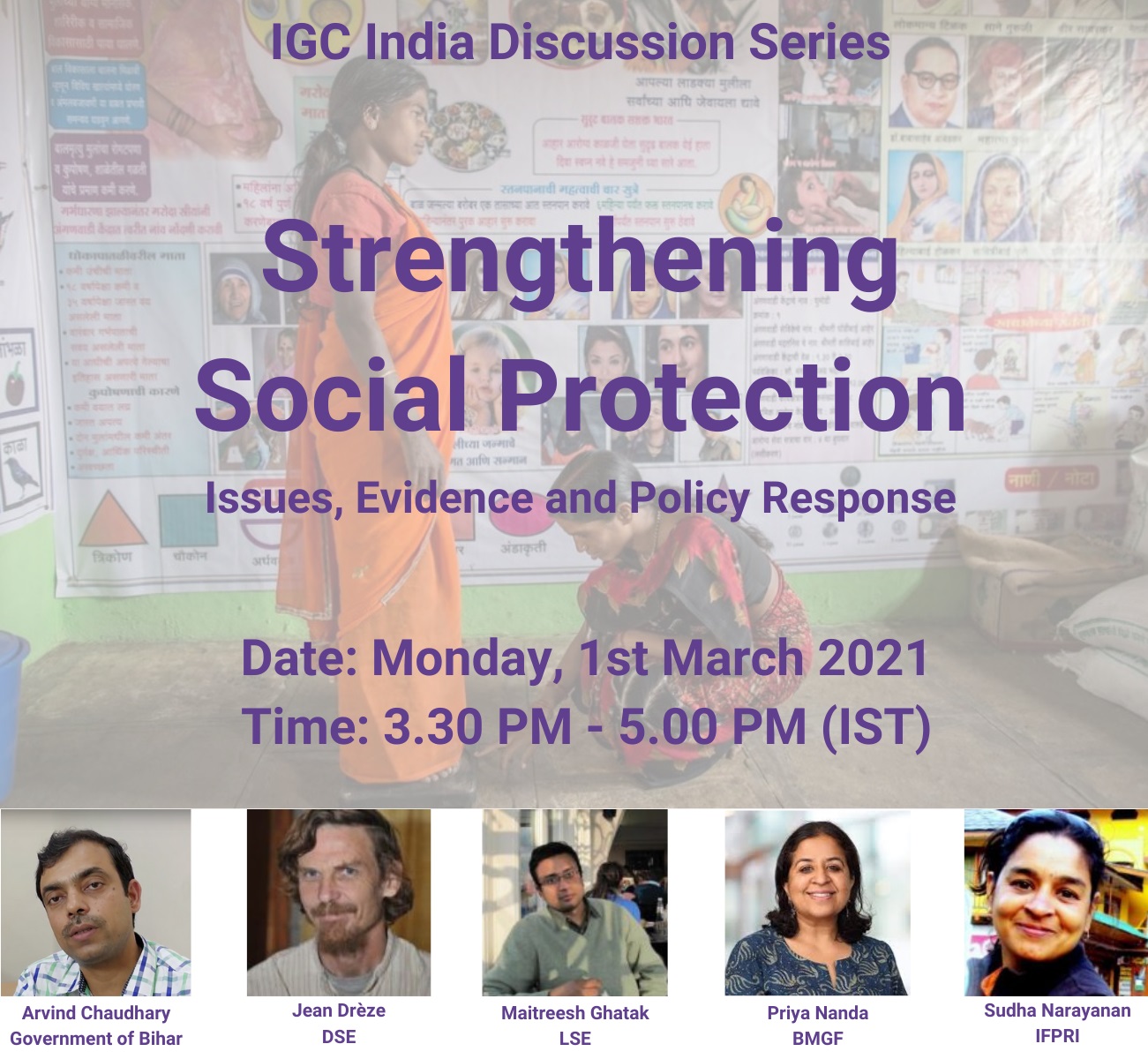Events of IGC

Over the last several decades, the Government of India with State Governments have introduced several cash transfer programmes with an aim to improve social welfare outcomes. While social protection programmes in India have helped to reduce poverty significantly, they are not without their problems and there is limited credible evidence on the impact of these programs on outcomes. In the webinar, we will try to address implementation challenges and policy solutions to ensure ease of access of the vulnerable population.
This necessitates the need to create a space to have the discussions around this issue. Thereby, to facilitate a discussion International Growth Centre (IGC) of London School of Economics (LSE) and Asian Development Research Institute (ADRI) is organising a webinar on ''Strengthening Social Protection' on 1st March 2021 at 15:30 IST - 17:00 IST.
Panellists: Arvind Chaudhary (Government of Bihar), Jean Drèze (Delhi School of Economics and Ranchi University), Maitreesh Ghatak (London School of Economics), Priya Nanda (Bill & Melinda Gates Foundation), and Sudha Narayanan (International Food Policy Research Institute)
Patna, March 1st. The International Growth Centre (IGC) and Asian Development Research Institute (ADRI) organised a webinar titled “Strengthening Social Protection” on 1st March 2021. The panel was moderated by Priya Nanda (Bill & Melinda Gates Foundation) and event panellists were Arvind Chaudhary (Government of Bihar), Jean Drèze (Delhi School of Economics and Ranchi University), Maitreesh Ghatak (London School of Economics), and Sudha Narayanan (International Food Policy Research Institute).
Over the last several decades, the Government of India with State Governments have introduced several cash transfer and in-kind programmes with an aim to improve social welfare outcomes. While social protection programmes in India have helped to reduce poverty significantly, they are not without their problems and there is limited credible evidence on the impact of these programs on outcomes. In the webinar, we discuss the implementation challenges and policy solutions to ensure ease of access of the vulnerable population.
Jean Drèze: Two factors that may have resulted in declining nutrition indicators-One, undermining of child budget i.e., budget cuts of ICDS which is 40% lower in real terms to what it was 7 years ago; Second, economic crisis since 2016 onwards has been impacting the welfare programs. He further commenting on the choice between THR vs Cash, he said THR is not just a transfer program but it is an activity that is delivered through anganwadis, a valuable institution and which also involves members of society, the anganwadi workers. It recognizes community and brings women into discussion.
Sudha Narayanan - One of the key challenges of cash vs THR program is the low agency of women i.e., freedom to access banks, freedom to decision making and household distribution of food. Between cash vs THR, the global evidence suggests that its goal and context dependent. A combination of a cash and in-kind transfer and (including “wet” meals) could be a way forward. She further emphasized on 3 key concerns – first, the concern on the retreat of commitment towards social security by Govt. of India whereas there is a need for expansion and strengthening of social security schemes; Second, the issue of centre and state finances and who shares the burden, some of the well-functioning social systems has been initiators of states Third, there is less of inter-state learning and exposure and not much evidence being generated in this space.
Maitreesh Ghatak – Referring to Welfare Economics paper by Subramanian-Felman he states that there has been an uptake in banking and cooking gas scheme but for other schemes there hasn’t been much effect. He further remarked that NFHS5 indicators on nutrition is alarming and poverty numbers have been deteriorating which can be due to many factors policy shocks, demonetisation and Covid etc.. He states that during pandemic there is a need for additional expenditure for social welfare and the extra expenditure done by Govt. of India doesn’t stand out as per the recently published IMF (International Monetary Fund) report on country comparisons. He further said on social security schemes, we have to look at the cost and benefits of the schemes and the need for complementarity of various schemes such as combination of cash & THR. Additionally, on implementing an Inclusive Growth Dividend (IGD) pegged at 1% of GDP per capita, he stated that India already has PM Kissan, what we are proposing is doubling of that allocation and bringing everyone under the net-A universal scheme that includes all & to avoid exclusion errors.
Arvind Chaudhury – During Covid19, it was a time of distress and in initial days Construction and many other works were not permitted, but basic framework of MNREGA was allowed and we focused on individual works and Pradhan Mantri Awas Yojna works. Then we went into the massive exercise of how to be ready for the reverse migration, one of the strategies was to meet them at the first point of interaction at quarantine centres – here we ensured we facilitated registration of aadhar and job cards for the migrant workers. Garib Kalyan Rojgar Abhiyaan (GKRY) which was launched was a campaign but not a new program, all the works was expediated to meet the needs of the population. Though this was not a new scheme but this impacted the availability of works in rural areas and this helped mitigate distress to great extent.